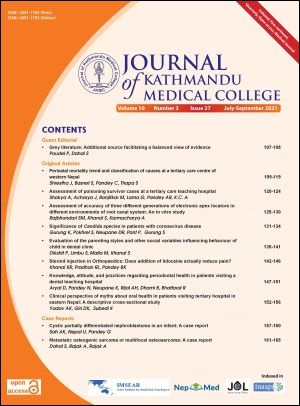Evaluation of the parenting styles and other social variables influencing behaviour of child in dental clinic
DOI:
https://doi.org/10.3126/jkmc.v10i3.41237Keywords:
Child behaviour, Family type, Parenting style, SiblingAbstract
Background: Parents play a major role in the physical and emotional development of children. The parenting style has influence over child behaviour in the dental office. Other factors like family type, presence of siblings as well as position of child in the family may also affect the behaviour of the child in the dental clinic.
Objectives: To evaluate the parenting styles and other social variables influencing child dental behaviour.
Methods: One hundred and fifty-one healthy children aged 4-12 years were recruited by convenience sampling during their regular dental visits to Paediatric Dentistry Department, Kantipur Dental College from April to July 2021 after ethical clearance. Family and child demographic data were evaluated through a questionnaire. The accompanying parent completed the Parenting Styles and Dimensions Questionnaire (PSDQ). The behaviour of the children was evaluated during the routine non-invasive dental procedure using Frankl behaviour rating scale.
Results: All three parenting styles were identified among Nepalese parents, including authoritative (136, 90.06%), authoritarian (6, 3.97%), and permissive parenting styles (9, 5.96%). Most of the children showed positive behaviour (98, 64.9%). Significant associations were detected with age (p = 0.027) and gender (p = 0.015) and their behaviour, but not between parenting styles, type of family, number of siblings, and position of child in the family with behaviour.
Conclusion: The behaviour of the child was significantly associated with the age of the child, with younger children exhibiting more negative dental behaviour than older ones. However, other factors did not have association with child behaviour.
Downloads
Downloads
Published
How to Cite
Issue
Section
License
Copyright © Journal of Kathmandu Medical College
The ideas and opinions expressed by authors or articles summarized, quoted, or published in full text in this journal represent only the opinions of the authors and do not necessarily reflect the official policy of Journal of Kathmandu Medical College or the institute with which the author(s) is/are affiliated, unless so specified.
Authors convey all copyright ownership, including any and all rights incidental thereto, exclusively to JKMC, in the event that such work is published by JKMC. JKMC shall own the work, including 1) copyright; 2) the right to grant permission to republish the article in whole or in part, with or without fee; 3) the right to produce preprints or reprints and translate into languages other than English for sale or free distribution; and 4) the right to republish the work in a collection of articles in any other mechanical or electronic format.




